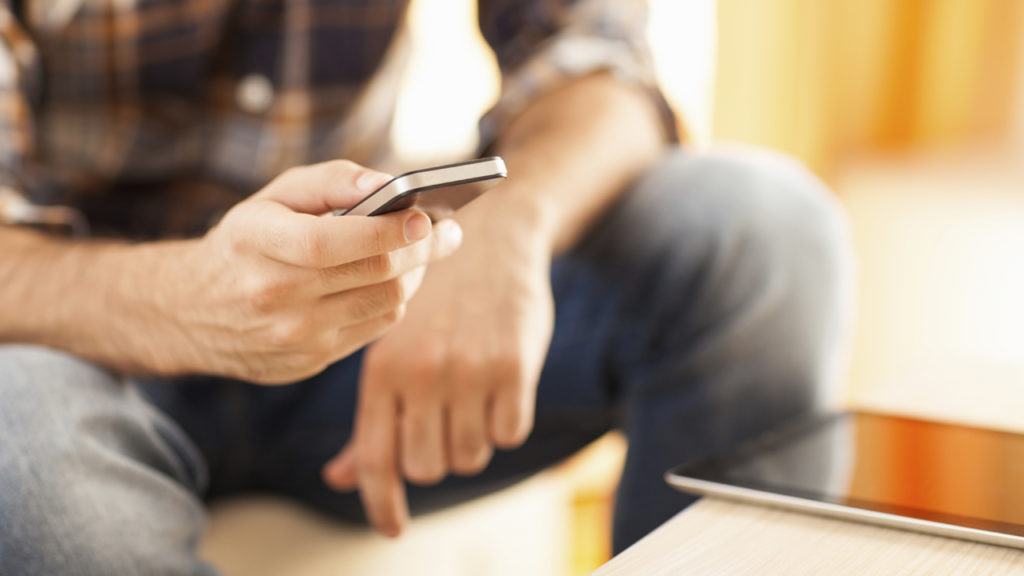I thought I would never purchase an iPhone. I figured I didn’t need it (I had a perfectly functional cell phone), and I was afraid if I got one, I would end up like those annoying iPhone users who were constantly checking their phone like they were looking for their own vital signs. But it was the camera that got me.
I was tired of using a substandard cell phone camera to capture my daughters’ unexpected adorable moments. And I figured if those memories were priceless, then — you know, maybe $250 wasn’t too much to pay for a cell phone.
The next thing I knew, I was signing a two-year contract for a phone I had once shunned as unnecessary. And when I held it for the first time — appreciating the simple, sleek design — I felt proud. After all the years of owning dumb-phones, it felt good to finally own the best of the best — but what I didn’t expect was that it would end up threatening to own me.
Exposed to the Virus
It took a while before I noticed my growing attachment to the phone. I certainly knew I was spending a lot of time staring at that glowing rectangular screen, but I told myself I was just exploring how it worked. The problem was that there was always something new to explore — a new app to download, a new text to answer, a new photo to edit.
“You’re starting to get like Carly with that phone,” my wife said one day. Our friend Carly was perpetually glued to her smartphone, totally unaware of how rude she was being to everyone around her.
“No, I’m not,” I said, telling myself that Carly was an iPhone addict — unlike me. I just used mine to get directions, check the weather, keep to-do lists, browse the Internet, post witty status updates on Facebook, check my email, read the Bible, listen to music, post photos on Instagram, and respond to important texts — all day long.
I didn’t want to admit it, but I wondered if she was right.
A Family Pandemic
The first of several wakeup calls happened when my wife, kids and I traveled home to be with my family for Thanksgiving. Not only did I find myself increasingly disengaged as I Instagrammed and Facebooked every other moment on the trip, I noticed my family was checked out too, because for the first time, almost everyone had a smartphone.
Toward the end of the week, I realized I’d never seen so much of the tops of everyone’s heads. Our collective smartphone attachment was requiring us to look down all the time as we texted, played games, Facebooked, watched videos and used the Internet. It was like the smartphone had become the newest, most interesting member of our family. And although I wanted to believe everyone else was more attached to their phones than me, deep down, I knew better.
My iPhone had grown on me — literally. It was attached to my hand, clinging to me like a localized infection I didn’t want to cure. I knew it, and I wanted to change, but not enough to do anything about it.
The Cost of Sickness
One day, I was needlessly composing a text when I realized that my little girl was on the floor repeatedly saying, “Daddy, look at me. Look at me.” I meant to look at her, but I just needed a few more seconds to finish my text.
You’re going to miss it, I said to myself, but I kept texting anyway.
By the time I finally looked up, I had missed it, whatever it was. I felt a twinge of regret, realizing that I was on my way to being remembered by my children as the dad whose head was perpetually bowed before his iPhone in reverent, glassy-eyed meditation — the dad who was there, but not present. I tucked the moment away in my mind, and began to recognize that the stakes had been raised in the war for my attention.
Not long after that, at the urging of my wife, I went on a one-day silent retreat put on by a local ministry. They asked that we not bring our electronic devices, which unnerved me a little bit. I didn’t like the thought of an unanswered text message just sitting there in my phone all day, much less the thought of someone calling and not getting an answer. But the rules were the rules, so on the day of the retreat, I drove up, checked Facebook one more time, left my cell phone in the car, and locked the door.
As the hours rolled on that day, I was pleasantly surprised by what a relief it was to be separated from my phone, to get still and listen for something other than the sound of a new text message. And as I silently meditated on Scripture during the retreat, the Lord was able to speak to my heart in a profound way He hadn’t in many years. That wouldn’t have happened if I’d had my phone on me that day. God would’ve gotten the same treatment as my daughter, and once again, I would’ve missed out.
I knew that I had to change, and I actually wanted to — not because I was trying to be a good Christian user of my iPhone, but because I wanted to live again, to be able to feel connected without the help of a machine.
Rehab
I’m not going to lie: I never seriously considered getting rid of my iPhone altogether. It was too helpful of a tool in my life to do that. Instead, I prayed for grace to break my iPhone attachment, and decided to place a couple of manageable restrictions upon my cell phone use.
For one, I committed not to check Facebook while in the presence of my family (as a father of clingy toddlers, this had the practical effect of cutting my Facebook usage down by about 70 percent). I also decided to stop using the iPhone as a time-killer when I was in line at the store or in an elevator. Instead, when I had time to kill, I would use the Bible app to read the Bible in Spanish (I’m a Spanish-speaker who’s always looking for opportunities to practice and — what do you know — it was right there in the palm of my hand).
My techno-reboot definitely reduced my level of engagement with social media while increasing the amount of time I was spending with my family. In the meantime, I began discovering new things in Scripture, improving my Spanish vocabulary, and feeling generally more present in the moment and less tied to that little cigarette-pack-shaped telephone.
Growing Up
In the midst of all this, the Lord began speaking to me about a number of areas in my life through 1 Corinthians 13:11, which says, “When I was a child, I spoke like a child, I thought like a child, I reasoned like a child. When I became a man, I gave up childish ways” (ESV).
As I applied it to my smartphone usage, I came to see that God wasn’t calling me to be an ascetic who never tweeted or posted a photo on Instagram. He was calling me to grow up and use the phone like a man, to own my iPhone, rather than let it own me.
Copyright 2013 Joshua Rogers. All rights reserved.












